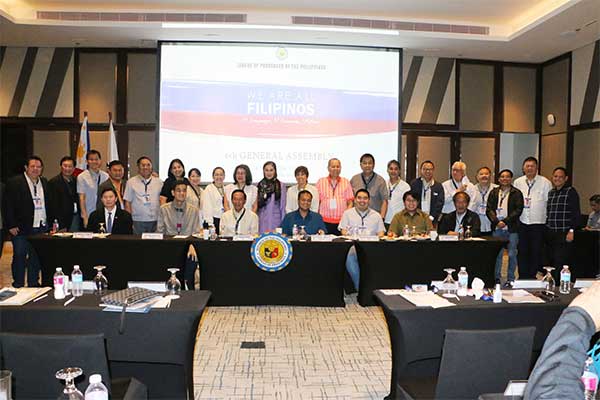

By Angela Ballerda, Gab Yanzon and Carmela Fonbuena
Philippine Center For Investigative Journalism
First of 2 parts
Political dynasties continue to hold a tight grip on provinces in the Philippines.
By the count of the Philippine Center for Investigative Journalism (PCIJ), at least 71 of the country’s 82 provincial governments or 87% are led by members of political dynasties.
This dominance underscores a system where power is frequently passed down within families, raising concerns about its impact on democratic representation and political diversity.
Eighteen of these political dynasties are considered “obese” with at least five family members seeking different electoral positions next year.
The Marcoses of Ilocos Norte, Singsons of Ilocos Sur, Ortegas of La Union, Ynareses of Rizal, Tolentinos of Cavite, Umalis of Nueva Ecija, Pinedas of Pampanga, Garcias of Bataan, and Khos of Masbate have ruled over these Luzon provinces for decades.
In Mindanao, many political dynasties control the provinces. The Dimaporos of Lanao del Norte, Adiongs of Lanao del Sur, the Pacquiaos of Sarangani, the Mangudadatus of Maguindanao, the Mendozas and Taliños of Cotabato, the Jalosjoses of Zambaonga del Norte, the Yus of Zamboanga del Sur, the Tans of Sulu, and the Salimans and Hatamans of Basilan have dominated local politics.
The May 2025 elections are unlikely to bring significant change. Forty-seven of the 71 incumbent governors belonging to political dynasties are seeking reelection.
Meanwhile, 19 sitting governors who are not reelectionists have family members seeking to replace them.
Incumbency advantage

In many cases among the country’s biggest political dynasties, it is the leaders of the clans who occupy the provincial capitol.
The office of the highest local executive official can also serve as the seat of power for local political kingpins.
The Marcos family has dominated the province of Ilocos Norte since the 1970s. The clan has exercised an unbroken control of the capitol for the last 26 years or since 1998.
President Ferdinand Marcos Jr. served three terms as governor, from 1998 to 2007, before he was elected as a district representative in 2007 and senator in 2010.
His cousin Michael Marcos Keon served one term in the capitol, from 2007 to 2010, before his sister Sen. Imee Marcos took over in 2010. She also served three terms until 2019.
In next year’s elections, presidential nephew Gov. Matthew Marcos Manotoc will aim to swap seats with his aunt Vice Gov. Cecilia Araneta-Marcos.
In Cebu in the Visayas, two political clans have controlled the capitol for the last three decades.
Gov. Gwendolyn Garcia is serving her second term in the capitol and will seek to win a third term next year.
She first served as governor of the province in 2004 when she succeeded her father Pablo “Pabling” Garcia, who completed three terms from 1995 to 2004. Gwendolyn also served three terms as governor from 2004 to 2013.
She ran and won two terms as representative of Cebu’s 3rd District, from 2013 to 2019, before she returned to the capitol. The gap between 2013 to 2019 was served by Hilario Davide II.
Political science professor Julio Teehankee, who has studied political dynasties in the Philippines for over two decades, said clans have clearly benefited from incumbency advantage.
“If you are elected, you have all the resources of the state. You control the budget and you have built-in support because the city hall or capitol staff is under you,” Teehankee told PCIJ.
Power begets power in a patron-client political system, he said. The longer the families hold it, the bigger the power they are able to accumulate.
National politics
Political dynasties grow influence when they aspire for and win national seats. But it is not always guaranteed.
The Escudero clan ruled Sorsogon province as early as the 1940s when Salvador Escudero, grandfather of Senate President Francis Escudero, served as governor.
Francis succeeded where his father, the late former Rep. Salvador Escudero III, failed. He won a Senate seat in 2007 when he was 37.
Francis became so popular that he almost ran for president in 2010, but he gave way to President Benigno Aquino III. Escudero ran for vice president in 2016, but he lost to Leni Robredo.
After these political setbacks, he took a break from national politics and served as governor of Sorsogon from 2019 to 2022. He returned to the Senate in 2022 and is now the leader of the legislative chamber.
There are clans who continue to try but are only able to capture as high as the provincial capitol so far.
Ilocos Sur’s Luis “Chavit” Singson has been in and out as governor of the province from 1972 until 1986, from 1992 to 2001, from 2004 to 2007, and from 2010 to 2013.
He is considered the political kingmaker in his province, but a national position has eluded him. He tried but failed to win a Senate seat in 2007.
Despite his defeat in national elections, his family continued to grow political influence in the province and in the House of Representatives. In 2016, he ran and won as mayor of Narvacan town.
He will try his luck again to win a Senate seat in next year’s elections.
Thin, fat, obese dynasties
Many political dynasties are not as big as the Marcoses and the Singsons, but they can also monopolize political power for decades.
In Quirino province in northern Luzon, the Cua father and son have been swapping positions to control the capitol for the last 17 years. Gov. Dakila Cua was first elected governor in 2007. He served one term and then gave way to his father Junie Cua, who served for nine years until 2019.
Dakila succeeded his father in 2019 and is now on his second term. He will seek a third term next year. The other candidate in the family next year is his wife Mindy, who has occupied his former district seat in the House.
In Iloilo where multiple dynasties operate, the Defensors have exercised an unbroken rule of the capitol in the last 14 years or since 2010. Arthur Defensor Sr. served as governor from 1992 to 2001, followed by Niel Tupas Sr., who took over for the next nine years, from 2001 to 2010.
Defensor was elected governor again in 2010. The family has not let go of the capitol since.
His son Arthur Defensor Jr. succeeded his father in 2019. The younger Defensor is on his second term in the capitol and is seeking his third term next year. The other family member running in next year’s elections is reelectionist Rep. Lorenz Defensor.
The PCIJ list also includes what Teehankee described as “dormant” dynasties.
In Zamboanga Sibugay, Gov. Dulce Ann Hofer is the only one running for elected office next year. But Hofer is a big political name in the province. The governor’s father George Hofer is dubbed as the founding father of the province. Her brother George II ran for election twice in the past but lost.
“I refer to such cases as dormant dynasties in which one or none is left in active politics, but they can grow fat again in the future,” Teehankee said.
Whether expanding, consolidating, or lying in wait, political dynasties show no signs of relinquishing their hold on power in the Philippines. — PCIJ.org